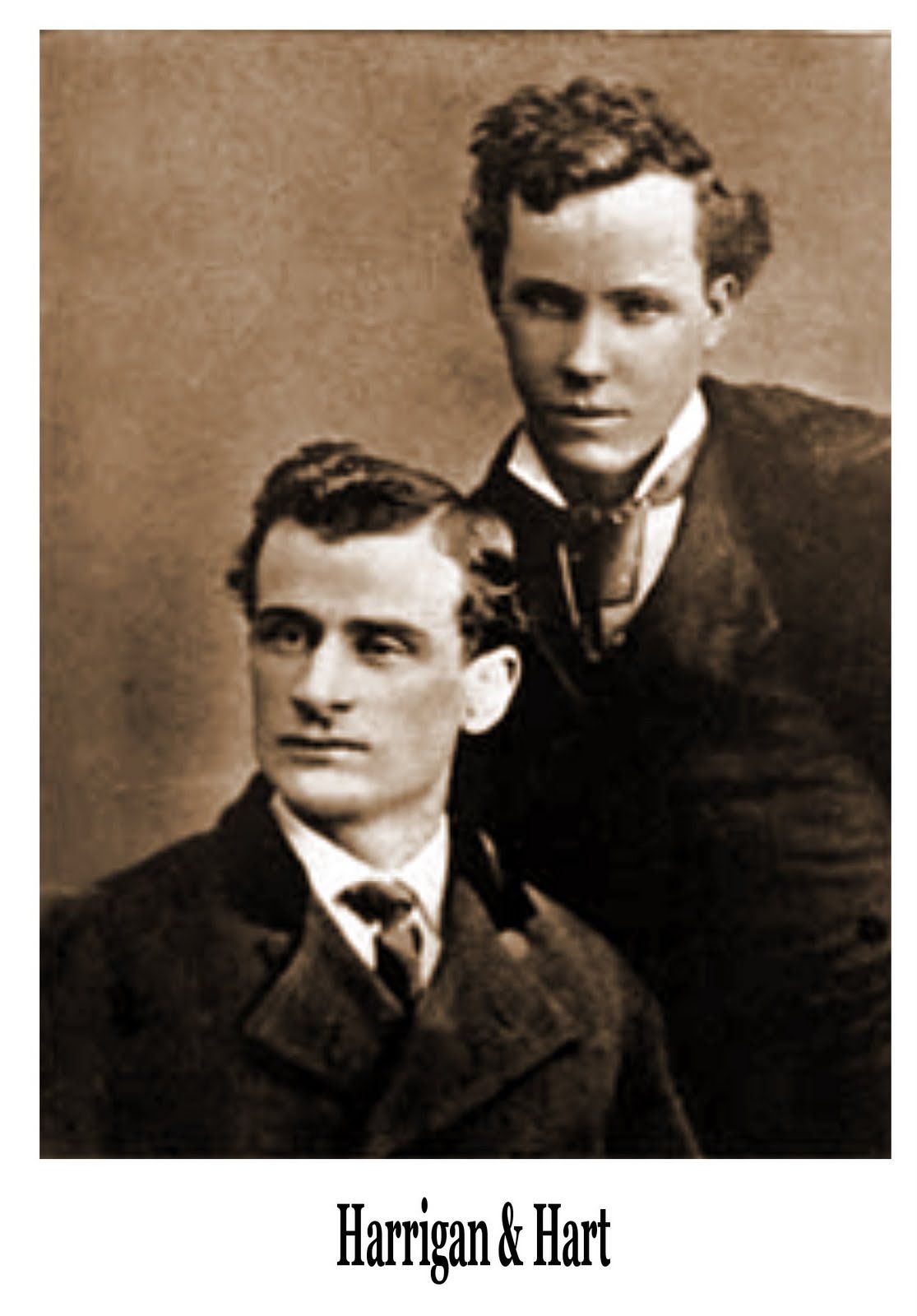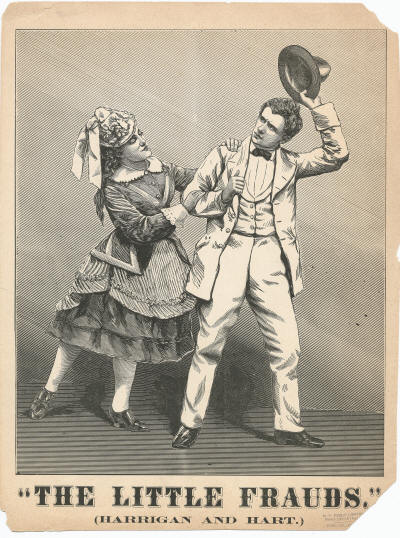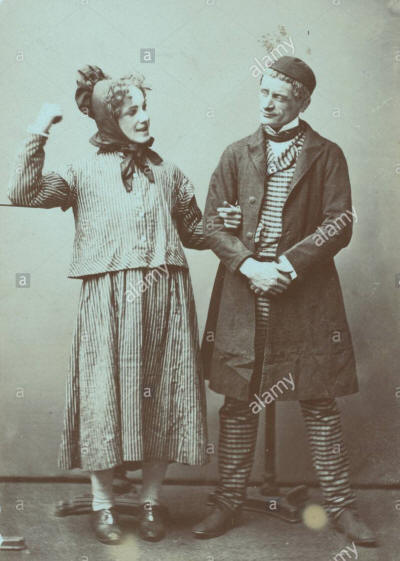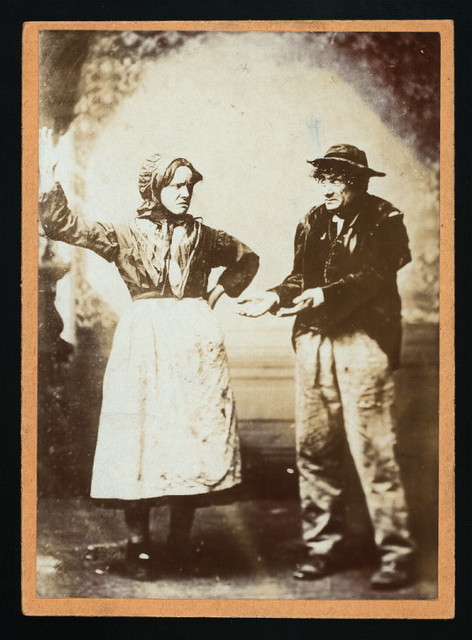Queer Places:
The New Theatre Comique, 730 Broadway, New York, NY 10003
Saint John's Cemetery
Worcester, Worcester County, Massachusetts, USA
 Tony
Hart, born Anthony J. Cannon (July 25, 1855 – November 4, 1891), was an
American actor, comedian and singer. He is best known for working with Edward
Harrigan in the late 19th century comedy team of Harrigan & Hart. Tony Hart
was described as, "best genteel wench that ever trod the boards." His parents
were less enthused about his theatrical leanings. In fact they sent him to
reform school in an effort to keep him from the stage. But at the age of
thirteen, he escaped from the Westborough reformatory and hit the road, doing
stints as a bootblack, newsboy, and singer (not to mention joining a circus or
two). He began his career in minstrel shows as "Master Antonio, the Boy
Soprano." When he was 16, Tony Hart met Harrigan. The two became a fixture at
the Theatre Comique in New York City by the mid-1870s performing in Harrigan's
farcical sketches. The slight and short Hart usually portrayed the female
roles in their comic sketches and plays. Their breakthrough hit was the 1873
song and sketch "The Mulligan Guard", a lampoon of an Irish neighborhood
"militia" with music by David Braham. It became their signature piece, and
they featured it in many of their slapstick skits and plays.
Tony
Hart, born Anthony J. Cannon (July 25, 1855 – November 4, 1891), was an
American actor, comedian and singer. He is best known for working with Edward
Harrigan in the late 19th century comedy team of Harrigan & Hart. Tony Hart
was described as, "best genteel wench that ever trod the boards." His parents
were less enthused about his theatrical leanings. In fact they sent him to
reform school in an effort to keep him from the stage. But at the age of
thirteen, he escaped from the Westborough reformatory and hit the road, doing
stints as a bootblack, newsboy, and singer (not to mention joining a circus or
two). He began his career in minstrel shows as "Master Antonio, the Boy
Soprano." When he was 16, Tony Hart met Harrigan. The two became a fixture at
the Theatre Comique in New York City by the mid-1870s performing in Harrigan's
farcical sketches. The slight and short Hart usually portrayed the female
roles in their comic sketches and plays. Their breakthrough hit was the 1873
song and sketch "The Mulligan Guard", a lampoon of an Irish neighborhood
"militia" with music by David Braham. It became their signature piece, and
they featured it in many of their slapstick skits and plays.
Harrigan teamed up with Hart for a highly successful thirteen years. From
the onset, Hart played the female roles, beginning with "The Little Fraud" in
which Hart was a "fresh-faced Dutch girl with a mellow voice." The detective
William Pinkerton, an expert at seeing through disguises, once refused to
believe that Hart was a man even after being taken backstage following a
performance and allowed to scrutinize his costume and make-up at close range.
Pinkerton was not persuaded of the truth until Hart had pulled off his wig and
let loose with a few robust phrases that could only have been learned in a
boys’ reform school. Harrigan and Hart were so popular that they built their
own minstrel house in 1881 only to have it burn down three years later. The
team's last Broadway performance was in May 1885. They ended their partnership
shortly thereafter and Tony Hart teamed up with his wife Gertie, often with
both playing female roles. Tony's professional downfall came as a result of
late-stage syphilis.



Hart was born in Worcester, Massachusetts, and began his career in Boston.
He met Harrigan in Chicago in 1870 and soon changed his name to Tony Hart.
Harrigan and Hart went in 1871 to Boston, where they had their first big
success at John Stetson's Howard Athenaeum.[1]
They then moved on to New York, where they first worked with Tony Pastor
before beginning a long run at Josh Hart's Theatre Comique. By the mid-1870s
they began moving from the variety show toward musical theatre. Harrigan's
sketches on the Comique's crowded bill featured comic Irish, German and black
characters drawn from everyday life on the streets of New York. The slight and
short Hart usually portrayed the female roles in their comic sketches and
plays. They began moving from the variety show toward musical theatre.[2]
TheiTheir breakthrough hit was the 1873 song and sketch "The Mulligan Guard", a
lampoon of an Irish neighborhood "militia" with music by David Braham, who
would become their musical director and Harrigan's father in law. It became
their signature piece, and they featured it in many of their slapstick skits
and plays.[3]
In 1876, Harrigan took over the Comique himself, along with Hart and manager
Martin Hanley.
By 1878, with The Mulligan Guard Picnic, Harrigan & Hart settled
down on Broadway and performed in seventeen of their shows over the next seven
years.[4]
Their most popular musical was the Mulligan Guard's Ball (1880). Though
still broad and farcical, full of chaos and hilarity, these shows integrated
music with a more literary story line, together with dance, and they began to
resemble modern musical comedy. Harrigan wrote the stories and lyrics, and
Braham wrote the music. The action of the plays took place in downtown
Manhattan and concerned real-life problems, such as interracial tensions,
political corruption, and gang violence, all mixed with broad, street-smart
comedy, puns and ethnic dialects. Harrigan played the politically ambitious
Irish saloon owner "Dan Mulligan", and Hart played the African-American
washerwoman "Rebecca Allup".[5]
Although the Theatre Comique was eventually shut down for financial
reasons, Harrigan and Hart announced in 1881 that they would build a fresh and
elegant "New Theatre Comique" several blocks further north on Broadway. The
building they renovated was originally the home of the Church of the Messiah
but had hosted many other theatres throughout the years.[6]
However, this theatre was not to last; it burned to the ground in 1884.[7]
After the theatre collapsed, so did the partnership. Harrigan's habit of
hiring relatives soured his partnership with Hart. In May 1885, five months
after the fire, Harrigan and Hart appeared on Broadway together for the last
time.[3]
Hart and his wife, Gertie Granville, went on to appear in other
productions, but he never achieved the popularity that he had enjoyed with
Harrigan. His medical problems stemming from paresis and syphilis also
increased, as his financial condition worsened.[8]
His friends and fans mounted a benefit production, on March 22, 1888, to raise
funds for his living expenses and medical treatment. He developed dementia and
spent most of his last years in a state mental institution.[3]
He died in Worcester, Massachusetts, at the age of 36 from complications of
paresis and advanced syphilis. He is buried in St. John's Cemetery in
Worcester.[3]
In 1In 1985, a musical celebrating the rise of the partnership, Harrigan 'N
Hart, opened on Broadway. The show has a book by Michael Stewart, lyrics
by Peter Walker, and music by Max Showalter is based on the book The Merry
Partners by
by Ely
Jacques Kahn, Jr. and material found by Nedda Harrigan Logan. Harry Groener
portrayed Harrigan, Mark Hamill (of Star WarsThe
New York Times found the show dull and "aimless".[9]]
and so did audiences, as it closed after 25 previews and four regular
performances.[10]
My published books:


BACK TO HOME PAGE

- https://en.wikipedia.org/wiki/Tony_Hart_(theater)
 Tony
Hart, born Anthony J. Cannon (July 25, 1855 – November 4, 1891), was an
American actor, comedian and singer. He is best known for working with Edward
Harrigan in the late 19th century comedy team of Harrigan & Hart. Tony Hart
was described as, "best genteel wench that ever trod the boards." His parents
were less enthused about his theatrical leanings. In fact they sent him to
reform school in an effort to keep him from the stage. But at the age of
thirteen, he escaped from the Westborough reformatory and hit the road, doing
stints as a bootblack, newsboy, and singer (not to mention joining a circus or
two). He began his career in minstrel shows as "Master Antonio, the Boy
Soprano." When he was 16, Tony Hart met Harrigan. The two became a fixture at
the Theatre Comique in New York City by the mid-1870s performing in Harrigan's
farcical sketches. The slight and short Hart usually portrayed the female
roles in their comic sketches and plays. Their breakthrough hit was the 1873
song and sketch "The Mulligan Guard", a lampoon of an Irish neighborhood
"militia" with music by David Braham. It became their signature piece, and
they featured it in many of their slapstick skits and plays.
Tony
Hart, born Anthony J. Cannon (July 25, 1855 – November 4, 1891), was an
American actor, comedian and singer. He is best known for working with Edward
Harrigan in the late 19th century comedy team of Harrigan & Hart. Tony Hart
was described as, "best genteel wench that ever trod the boards." His parents
were less enthused about his theatrical leanings. In fact they sent him to
reform school in an effort to keep him from the stage. But at the age of
thirteen, he escaped from the Westborough reformatory and hit the road, doing
stints as a bootblack, newsboy, and singer (not to mention joining a circus or
two). He began his career in minstrel shows as "Master Antonio, the Boy
Soprano." When he was 16, Tony Hart met Harrigan. The two became a fixture at
the Theatre Comique in New York City by the mid-1870s performing in Harrigan's
farcical sketches. The slight and short Hart usually portrayed the female
roles in their comic sketches and plays. Their breakthrough hit was the 1873
song and sketch "The Mulligan Guard", a lampoon of an Irish neighborhood
"militia" with music by David Braham. It became their signature piece, and
they featured it in many of their slapstick skits and plays.



